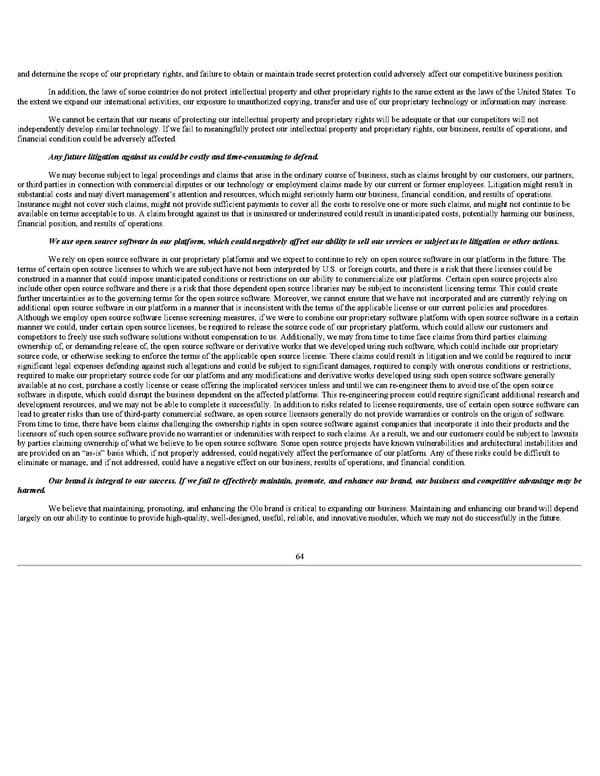and determine the scope of our proprietary rights, and failure to obtain or maintain trade secret protection could adversely affect our competitive business position. In addition, the laws of some countries do not protect intellectual property and other proprietary rights to the same extent as the laws of the United States. To the extent we expand our international activities, our exposure to unauthorized copying, transfer and use of our proprietary technology or information may increase. We cannot be certain that our means of protecting our intellectual property and proprietary rights will be adequate or that our competitors will not independently develop similar technology. If we fail to meaningfully protect our intellectual property and proprietary rights, our business, results of operations, and financial condition could be adversely affected. Any future litigation against us could be costly and time-consuming to defend. We may become subject to legal proceedings and claims that arise in the ordinary course of business, such as claims brought by our customers, our partners, or third parties in connection with commercial disputes or our technology or employment claims made by our current or former employees. Litigation might result in substantial costs and may divert management’s attention and resources, which might seriously harm our business, financial condition, and results of operations. Insurance might not cover such claims, might not provide sufficient payments to cover all the costs to resolve one or more such claims, and might not continue to be available on terms acceptable to us. A claim brought against us that is uninsured or underinsured could result in unanticipated costs, potentially harming our business, financial position, and results of operations. We use open source software in our platform, which could negatively affect our ability to sell our services or subject us to litigation or other actions. We rely on open source software in our proprietary platforms and we expect to continue to rely on open source software in our platform in the future. The terms of certain open source licenses to which we are subject have not been interpreted by U.S. or foreign courts, and there is a risk that these licenses could be construed in a manner that could impose unanticipated conditions or restrictions on our ability to commercialize our platforms. Certain open source projects also include other open source software and there is a risk that those dependent open source libraries may be subject to inconsistent licensing terms. This could create further uncertainties as to the governing terms for the open source software. Moreover, we cannot ensure that we have not incorporated and are currently relying on additional open source software in our platform in a manner that is inconsistent with the terms of the applicable license or our current policies and procedures. Although we employ open source software license screening measures, if we were to combine our proprietary software platform with open source software in a certain manner we could, under certain open source licenses, be required to release the source code of our proprietary platform, which could allow our customers and competitors to freely use such software solutions without compensation to us. Additionally, we may from time to time face claims from third parties claiming ownership of, or demanding release of, the open source software or derivative works that we developed using such software, which could include our proprietary source code, or otherwise seeking to enforce the terms of the applicable open source license. These claims could result in litigation and we could be required to incur significant legal expenses defending against such allegations and could be subject to significant damages, required to comply with onerous conditions or restrictions, required to make our proprietary source code for our platform and any modifications and derivative works developed using such open source software generally available at no cost, purchase a costly license or cease offering the implicated services unless and until we can re-engineer them to avoid use of the open source software in dispute, which could disrupt the business dependent on the affected platforms. This re-engineering process could require significant additional research and development resources, and we may not be able to complete it successfully. In addition to risks related to license requirements, use of certain open source software can lead to greater risks than use of third-party commercial software, as open source licensors generally do not provide warranties or controls on the origin of software. From time to time, there have been claims challenging the ownership rights in open source software against companies that incorporate it into their products and the licensors of such open source software provide no warranties or indemnities with respect to such claims. As a result, we and our customers could be subject to lawsuits by parties claiming ownership of what we believe to be open source software. Some open source projects have known vulnerabilities and architectural instabilities and are provided on an “as-is” basis which, if not properly addressed, could negatively affect the performance of our platform. Any of these risks could be difficult to eliminate or manage, and if not addressed, could have a negative effect on our business, results of operations, and financial condition. Our brand is integral to our success. If we fail to effectively maintain, promote, and enhance our brand, our business and competitive advantage may be harmed. We believe that maintaining, promoting, and enhancing the Olo brand is critical to expanding our business. Maintaining and enhancing our brand will depend largely on our ability to continue to provide high-quality, well-designed, useful, reliable, and innovative modules, which we may not do successfully in the future. 64
 Q3 2021 10Q Page 69 Page 71
Q3 2021 10Q Page 69 Page 71